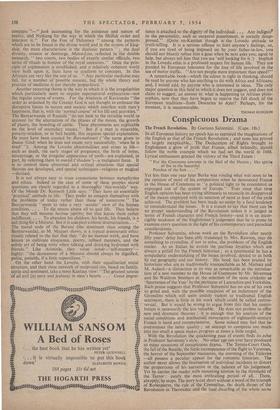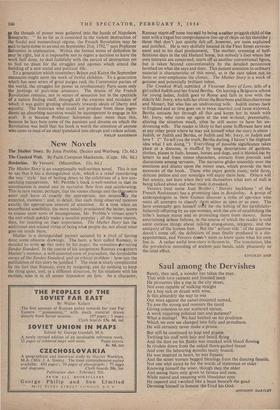Conspicuous Dia ma
The French Revolution. By Gaetano Salvemini. (Cape. 18s,) IN all European history no epoch has so captured the imaginations of the English as that of the French Revolution ; and none has proved so largely inexplicable. The Declaration of Rights brought to Englishmen a glow of pride that Fiance, albeit belatedly, should follow the noble example which we had set the world in 1688. Lyrical enthusiasm greeted the victory of the Third Estate :
" For the Commons convene in the Hall of the Nation ; like spirits of fire in the beautiful Porches of the Sun ...."
Yet less than one year later Burke was voicing what Was soon to be the opinion of most of his compatriots when he denounced France in the House of Commons as "a political light to be considered as expunged out of the system of Europe." Ever since that time English opinion has been trying ultimately to reconcile its disapproval of the means employed with its sanction of most at least of the ends achieved. The problem has been made no easier by a fatal tendency to misunderstand the issues. It is a truism to say that there can be no proper understanding of the Revolution unless it is judged in terms of French character and French history—and it is an inbor- rigible weakness of the Englishman's judgement that he is prone to examine every question in the light of his contemporary and parochial considerations.
Professor Salvemini, whose work on the Revolution after nearly fifty years' delay has 'been ably trans4ated by Mrs. Rawson, may do something to crystallise, if not to solve, the problems of the English reader. As an Italian he avoids the partisan loyalties which are always a pitfall for th9 French historian ; as a continental he has a sympathetic understanding of the issues involved, denied to us both by our geography and our history. His book has been praised by historians who are as traditionally irreconcilable as M. Mathiez and M. Aulard—a distinction in its way as remarkable as the introduc- tion of a new member to the House of Commons by Mr. Silverman and Sir Waldron Smithers or the selection of the same cricketer as ' Sportsman of the Year' by the, partisans of Lancashire and Yorkshire. Such praise suggests that Professor Salvemini has no axe of his own to grind and, with the possible exception of an indictment of the Girondins which will seem unduly violent to traditional English sentiment,. there is little in his work which could be called contro- versial. But it would be wrong to argue from this- that his contri- bution is necessarily the less valuable. He does not profess to offer new and dramatic theories ; it is enough that his analysis of the social conditions and intellectual movements of eighteenth-century France is lucid and comprehensive. Some indeed may feel that he pverstresses the latter quality ; an attempt to compress too much into too small a space makes progress at times a little turgid. its the threads of power were gathered into the hands of Napoleon Bonaparte. " In so far as it consisted in the violent destruction of the feudal and monarchical regime, the French Revolution may be laid to have come to an end on September 21st, 1792," says Professor Salvemini in explanation. Within the formal terms of definition he may be right, but it is impossible not to regret a decision to leave the work half done, to deal faithfully with the period of destruction yet to find no place for the struggles and agonies which attend the building of a new social and political life.
To a generation which remembers Belsen and Katyn the September massacres might seem the work of fretful children. To a generation which has seen series of great purges rack the Communist parties of the world, the struggles for power in revolutionary Paris seem only the jostlings of part-time amateurs. The drama of the French Revolution remains, not in scenes of sensation but in the spectacle Of a nation finding itself, through all the excesses and mistakes of which it was guilty groping ultimately towards ideals of liberty and equality. The historian who could not produce from these ingre- dients an absorbing narrative would be incompetent to engage in his craft. It is because Professor Salvemini does more than this, because he lays bare some of the passions and dreams on which the Revolution was built that his book is worth the attention of anyone who cares to read of an ideal translated into abrupt and violent action.
PHILIP SANDEMAN



































 Previous page
Previous page